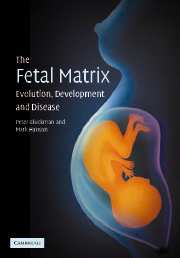Book contents
- Frontmatter
- Contents
- Preface
- 1 Shaping our destiny: genes, environment and their interactions
- 2 Mother and fetus
- 3 Fetal choices
- 4 Predictive adaptive responses and human disease
- 5 Obesity, diabetes and other diseases
- 6 The biology of predictive adaptive responses
- 7 Predictive adaptive responses – critical processes in evolution
- 8 Evolutionary echoes and the human camel
- 9 Improving human health
- 10 Fetal futures
- Further reading and references
- Index
4 - Predictive adaptive responses and human disease
Published online by Cambridge University Press: 05 November 2011
- Frontmatter
- Contents
- Preface
- 1 Shaping our destiny: genes, environment and their interactions
- 2 Mother and fetus
- 3 Fetal choices
- 4 Predictive adaptive responses and human disease
- 5 Obesity, diabetes and other diseases
- 6 The biology of predictive adaptive responses
- 7 Predictive adaptive responses – critical processes in evolution
- 8 Evolutionary echoes and the human camel
- 9 Improving human health
- 10 Fetal futures
- Further reading and references
- Index
Summary
The previous chapter introduced the concept that PARs are a general phenomenon that have evolved because they confer some protective functions in postnatal life. We will return to these questions later, but first can we demonstrate these phenomena exist in humans and, if so, what is their significance? This is the issue that, above all the others, led us to write this book. If PARs exist in humans, they might give us tremendously important insights into human health and indeed human evolution; moreover, they may have extremely important medical implications, for inappropriate PARs might lead to increased risk of disease in later life. The next two chapters present the evidence that this is indeed the case and begin to explore the implications.
Focusing on populations
Epidemiology is the study of disease patterns in whole populations, and epidemiologists look for correlations and associations that might suggest causal and risk factors. Epidemiology's power is in taking a population-based perspective. This hides individual variation by averaging it out. On the one hand, it will suggest factors that, on average, are likely to contribute to the causal pattern of disease. On the other hand, individual life histories focus on the individual risk of disease. These two very different perspectives must be kept in mind as we consider the role of PARs in the origin of human disease.
- Type
- Chapter
- Information
- The Fetal Matrix: Evolution, Development and Disease , pp. 78 - 102Publisher: Cambridge University PressPrint publication year: 2004



